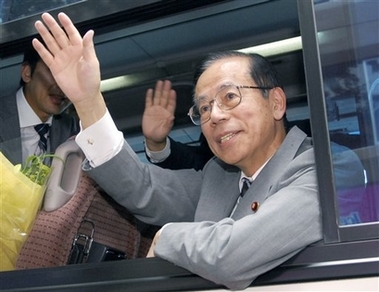Japan's ruling party choosing new leader
Updated: 2007-09-23 09:35
Tokyo -- Japan's ruling party was poised on Sunday to pick Yasuo Fukuda, who seeks warmer ties with Asian neighbors, to succeed Shinzo Abe as prime minister in an effort to revive party fortunes and fill a political vacuum.
 Former Chief Cabinet Secretary Yasuo Fukuda waves through a window of a bus after his joint campaign with former Foreign Minister Taro Aso in Sendai, Miyagi Prefecture (State), northeast of Tokyo, September 22, 2007. [AP] |
The Liberal Democratic Party's (LDP) main factions have rallied behind Fukuda after Abe's September 12 decision to resign in hopes the 71-year-old lawmaker, seen as a moderate, can bring stability after a year marked by scandals and an election rout.
"I want to get people to think that the LDP and politics as a whole are truly getting better by resolving problems one by one," the bespectacled Fukuda told a crowd while campaigning in northern Japan on Saturday.
Japan's next leader will face a divided parliament, with combative opposition parties controlling the upper house, and conflicting pressures to spend more to woo disaffected voters while also reigning in Japan's mammoth public debt.
The situation has raised fears of a policy deadlock at a time when Japan needs action on pension and tax reform and other issues.
A survey by Kyodo news agency published late on Saturday showed Fukuda well ahead of hawkish former foreign minister Taro Aso in the party poll. Other surveys have shown similar results.
The winner will be chosen prime minister on Tuesday by virtue of the ruling camp's huge majority in parliament's lower house.
Critics of Fukuda, chief cabinet secretary under Abe's predecessor Junichiro Koizumi, say he will be beholden to the LDP's old guard and backpedal on vital economic reforms.
Fans say his milder style will be welcome after Koizumi's five years of combative reforms and 12 months of scandals and upsets under Abe.
Both Fukuda and Aso have pledged to pay more heed to rural regions and other sectors hurt by reforms begun under Koizumi.
Pitfalls in Parliament
But both candidates have also acknowledged the limits on government spending, given a public debt already equivalent to one-and-a-half times Japan's gross domestic product.
"Structural reform is about revitalizing (local economies) without spending money," Fukuda said on a last-minute TV appearance along with Aso on Sunday.
Aso reiterated that the current five percent consumption tax may need to be raised to six percent, to fund an expected increase in social welfare costs.
Abe, who turned 53 on Friday, stunned allies and foes alike by announcing his decision to resign just days after staking his career on extending a Japanese naval mission in support of US-led military operations in Afghanistan.
One of the new prime minister's first battles will be over the mission, enabling legislation for which expires on November 1.
Close ally Washington is pressing Tokyo to continue refueling coalition ships in the Indian Ocean, but Japan's opposition parties, which can delay laws with their upper house majority, want to end the mission.
Although an advocate of a less US-centric diplomatic stance, Fukuda -- like Aso -- has stressed the need for Japan to keep playing its refueling role.
Avoiding pitfalls that would prompt a snap election for the lower house, which the ruling camp could well lose, will be another priority for Japan's new leader.
No general election need be held until 2009. But a deadlock in parliament could prompt one and many are eyeing next spring, after passage of the budget for the fiscal year starting next April, as a likely time.
The winning candidate in the LDP poll needs a majority, or 265, of 528 votes comprised of 387 parliamentarians and three representatives from each of the party's 47 prefectural chapters.
|
|
|
||
|
||
|
|
|
|